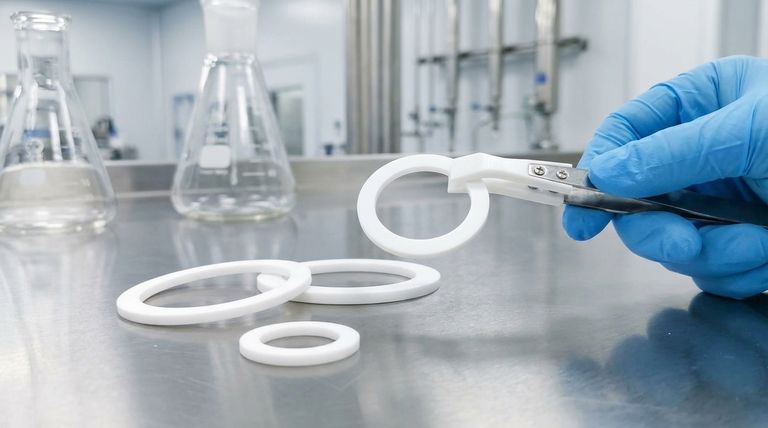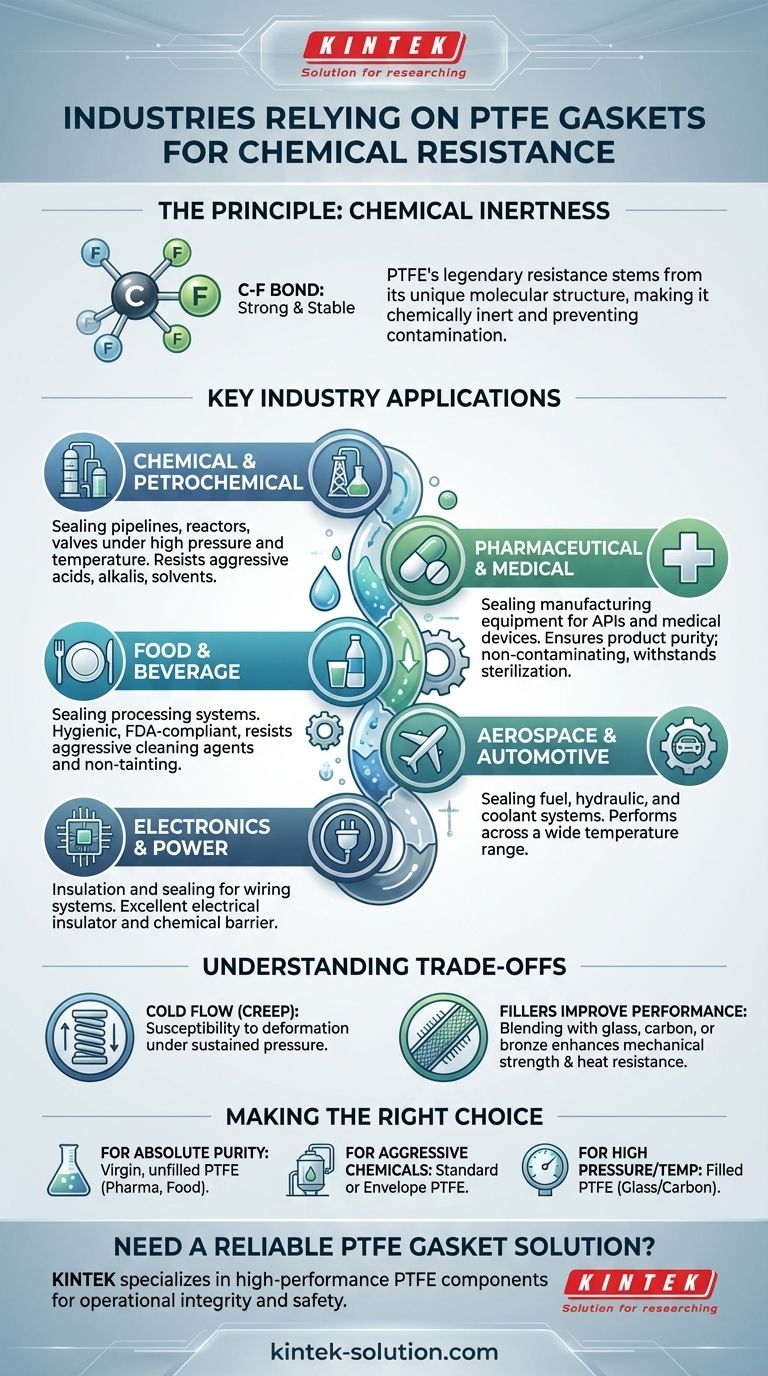At its core, Polytetrafluoroethylene (PTFE) gaskets are indispensable in any industry where aggressive chemicals are processed, manufactured, or transported. Their primary value stems from near-universal chemical resistance, making them a default choice for chemical processing, pharmaceutical manufacturing, food and beverage production, and the petrochemical sector. This unique property ensures both the integrity of the seal and the purity of the medium it contains.
The decision to use a PTFE gasket is driven by a foundational need for safety and purity. Its molecular structure makes it almost completely inert, preventing dangerous reactions with corrosive chemicals and eliminating the risk of contaminating sensitive products like pharmaceuticals or food.

The Principle: Why Chemical Inertness Is So Critical
PTFE's value is rooted in its unique molecular makeup. This structure is the source of its legendary resistance and stability, making it a cornerstone material in demanding environments.
The Strength of the Carbon-Fluorine Bond
PTFE consists of a long chain of carbon atoms, each completely shielded by a sheath of fluorine atoms. The bond between carbon and fluorine is exceptionally strong and stable.
This powerful bond makes the molecule highly non-reactive, or chemically inert. It effectively resists attempts by other chemicals to break it down or react with it.
Preventing Contamination and Unwanted Reactions
In industries like pharmaceuticals and food processing, preventing even trace amounts of contamination is non-negotiable. Because PTFE does not leach chemicals or react with the product, it ensures the purity of the final substance.
In chemical plants, this inertness prevents the gasket material itself from becoming an unintended reactant, which could lead to hazardous situations or process failure.
Resistance Across a Wide Chemical Spectrum
PTFE gaskets reliably seal systems containing a vast range of aggressive media. This includes strong acids, alkalis, solvents, and corrosive gases that would quickly degrade most other sealing materials.
Key Industry Applications Breakdown
The theoretical benefits of PTFE translate directly into practical applications across several critical industries. Each sector leverages its properties to solve specific challenges.
Chemical and Petrochemical Processing
These industries handle some of the most aggressive substances under high pressure and temperature. PTFE gaskets are used to seal pipelines, pressure vessels, and valve connections.
A special variant, the PTFE envelope gasket, which features a PTFE jacket over a more rigid core, is often used to provide a reliable seal on less-than-perfect flange surfaces, such as glass-lined or cast iron equipment.
Pharmaceutical and Medical Manufacturing
Purity is the paramount concern here. PTFE's non-contaminating and non-reactive nature makes it ideal for sealing reactors, piping, and equipment used to manufacture active pharmaceutical ingredients (APIs) and medical devices. It withstands stijl cleaning and sterilization protocols.
Food and Beverage Production
Similar to pharmaceuticals, the food industry requires hygienic, non-toxic, and non-tainting materials. PTFE gaskets meet these FDA requirements and resist breakdown from aggressive cleaning agents used concentração plant sanitation.
Aerospace and Automotive
In these sectors, PTFE gaskets are valued for their ability to seal systems containing fuels, hydraulic fluids, and coolants. Their performance across a wide temperature range is an additional, critical benefit.
Electronics and Power Generation
Beyond chemical sealing, PTFE is an excellent electrical insulator. It is used for insulation gaskets and in sealing electrical wiring systems, protecting components from both chemical exposure and electrical interference.
Understanding the Trade-offs
While exceptionally capable, PTFE is not without limitations. Understanding its trade-offs is key to using it correctly.
Susceptibility to Cold Flow (Creep)
PTFE is a relatively soft material. Under sustained pressure and temperature, it can slowly deform or "creep," which may lead to a loss of sealing pressure over time. This phenomenon is known as cold flow.
Limited Mechanical Strength
Compared to metals or harder plastics, PTFE has lower tensile strength and is more susceptible to physical damage. This is why designs like the envelope gasket or "filled" PTFE exist.
Fillers Improve Performance
To counteract creep and improve mechanical strength, PTFE is often blended with fillers like glass, carbon, or bronze. This creates a composite material with enhanced properties fatores high-pressure or high-temperature service, though it can slightly reduce chemical resistance.
Making the Right Choice for Your Goal
Selecting the correct PTFE gasket depends entirely on the specific demands of your application.
- If your primary focus is absolute purity: Use virgin, unfilled PTFE for pharmaceutical, medical, or food-grade applications.
- If your primary focus is sealing aggressive industrial chemicals: Standard PTFE or PTFE envelope gaskets are the most reliable choice for pipelines, flanges, and reactors.
- If your primary focus is high pressure or temperature stability: Choose a filled PTFE gasket (e.g., glass- or carbon-filled) to mitigate cold flow and ensure a durable seal.
Ultimately, choosing the right gasket is a critical engineering decision that ensures operational integrity, product purity, and workplace safety.
Summary Table:
| Industry | Primary Use Case | Key Benefit of PTFE |
|---|---|---|
| Chemical & Petrochemical | Sealing pipelines, reactors, valves | Resists aggressive acids, alkalis, solvents |
| Pharmaceutical & Medical | Sealing manufacturing equipment | Ensures product purity; non-contaminating |
| Food & Beverage | Sealing processing systems | Hygienic, FDA-compliant, resists cleaning agents |
| Aerospace & Automotive | Sealing fuel, hydraulic, and coolant systems | Performs across wide temperature ranges |
| Electronics & Power | Insulation and sealing for wiring | Excellent electrical insulator and chemical barrier |
Need a Reliable PTFE Gasket Solution?
At KINTEK, we specialize in manufacturing high-performance PTFE components, including seals, gaskets, liners, and custom labware. Whether your priority is absolute purity for pharmaceutical applications, durability for high-pressure industrial systems, or a custom design for a specialized need, we deliver precision and reliability.
We serve the semiconductor, medical, laboratory, and industrial sectors with custom fabrication from prototypes to high-volume orders.
Let us help you ensure operational integrity and safety. Contact our experts today to discuss your specific requirements!
Visual Guide

Related Products
- Custom PTFE Parts Manufacturer for Teflon Parts and PTFE Tweezers
- Custom PTFE Parts Manufacturer for Teflon Containers and Components
- Custom PTFE Square Trays for Industrial and Laboratory Use
- Custom PTFE Volumetric Flasks for Advanced Scientific and Industrial Use
- Custom PTFE Measuring Cylinders for Advanced Scientific and Industrial Applications
People Also Ask
- What industrial benefits do PTFE-machined parts offer? Achieve Peak Performance in Demanding Applications
- What design considerations are important for custom PTFE parts? Design for Performance & Reliability
- What chemical processing applications involve PTFE-machined parts? Essential Components for Corrosive & High-Purity Systems
- What are the unique properties of PTFE? Unlock Unmatched Performance in Demanding Applications
- What are the main applications of PTFE type Teflon? Unlock Its Versatility for Your Industry



















